21 sept 2015

Israel’s leadership of army staff praised the Egyptian coup authorities for flooding the Egypt-Gaza borders with seawater.
The occupation army staff acclaimed the flooding project carried out by the Egyptian authorities as part of intents to destroy cross-border tunnel activity, saying: “Such a service is just priceless.”
In what observers branded an unprecedented move set to please the Israeli occupation, the Egyptian army forces have begun to pump water from the Mediterranean Sea into underground tunnels on the southern borders of the besieged Gaza Strip.
The Water Authority in the blockaded Gaza Strip warned Saturday of the serious repercussions of such a project, saying the high-salinity water is a threat to nearby civilian homes and cultivated land lots.
According to Gaza’s Water Authority, the move poses a serious threat to the Strip’s water and food security.
Blockaded by the Israeli regime since 2007, Gaza used to receive urgently-needed supplies through the network of underground tunnels on its border with Egypt's Sinai Peninsula.
Palestinians in Gaza are living under inhuman conditions due to the tough siege imposed by the Israeli occupation and also due to Egypt’s quasi-permanent closure of the Rafah border-crossing.
The occupation army staff acclaimed the flooding project carried out by the Egyptian authorities as part of intents to destroy cross-border tunnel activity, saying: “Such a service is just priceless.”
In what observers branded an unprecedented move set to please the Israeli occupation, the Egyptian army forces have begun to pump water from the Mediterranean Sea into underground tunnels on the southern borders of the besieged Gaza Strip.
The Water Authority in the blockaded Gaza Strip warned Saturday of the serious repercussions of such a project, saying the high-salinity water is a threat to nearby civilian homes and cultivated land lots.
According to Gaza’s Water Authority, the move poses a serious threat to the Strip’s water and food security.
Blockaded by the Israeli regime since 2007, Gaza used to receive urgently-needed supplies through the network of underground tunnels on its border with Egypt's Sinai Peninsula.
Palestinians in Gaza are living under inhuman conditions due to the tough siege imposed by the Israeli occupation and also due to Egypt’s quasi-permanent closure of the Rafah border-crossing.
20 sept 2015
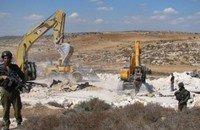
According to local sources, Israeli forces demolished five Palestinian-owned stores in the town of Hezma, just northeast of Jerusalem, on Sunday. Soldiers also reportedly assaulted two young Palestinian women during an incursion in the town of Beit Ummar, north of Hebron.
WAFA reports that an Israeli army team broke into the town, Sunday morning, and demolished five tinplate-surfaced stores, including a stone-cutting workshop, under the pretext of construction without a permit.
The stores are located in Area C, under complete Israeli military and administrative control.
The Israeli army and police have repeatedly vandalized residencies in Area C under the pretext of construction without permission.
Despite filing applications and constantly trying to build houses following the legal measures, Palestinians in the West Bank, especially East Jerusalem, are rarely granted construction permits by Israeli occupation authorities.
Although Palestinians in East Jerusalem are living in a part of the internationally recognized Palestinian Territory that has been under Israeli military occupation since 1967, they are denied citizenship and classified only as 'residents' whose permits can be revoked if they move away from the city.
They are also discriminated against in all aspects of life including housing, employment and services, and remain unable to access services in the West Bank due to the construction of Israel's apartheid wall.
In 2014 alone, Israeli authorities demolished a total of 97 buildings in East Jerusalem, while demolished five others in 2015, under the pretext of building without a construction permit, reported the United Nations Office for the Coordination of Humanitarian (OCHA).
Also on Sunday, Israeli soldiers assaulted two young Palestinian women during an incursion in the town of Beit Ummar, north of Hebron, according to local sources.
Mohammad Awad, coordinator of the Anti-Settlement Committee in the town, said an Israeli army force stormed the house of Khalil Abu-Dayyeh, a local Palestinian, and brutally assaulted his daughter, 20-year-old Nabila, leaving bruises throughout her body.
While the army assaulted and pepper sprayed 22-year-old Jamila Abu-Dayyeh, clashes erupted between Israeli soldiers and Palestinian youths in the same town. The soldiers used teargas canisters and rubber-coated bullets, causing multiple cases of suffocation by teargas inhalation.
Incidents of violence by Israeli soldiers against Palestinians, including children and women, have regularly been reported, either during Israeli arrest operations, home searches and raids, violent suppression of peaceful demonstrations, or while serving jail sentences in Israeli jails.
Many Palestinians have been injured or shot dead on sight for allegedly assaulting Israeli soldiers despite the fact they usually pose no threat to the lives of soldiers.
On July 23, Israeli army and undercover forces raided a house in Beit Ummar and shot dead an unarmed Palestinian elderly, 53-year-old Falah Abu-Maria, and injured his two sons, Mohammad and Ahmed, with live ammunition.
WAFA reports that an Israeli army team broke into the town, Sunday morning, and demolished five tinplate-surfaced stores, including a stone-cutting workshop, under the pretext of construction without a permit.
The stores are located in Area C, under complete Israeli military and administrative control.
The Israeli army and police have repeatedly vandalized residencies in Area C under the pretext of construction without permission.
Despite filing applications and constantly trying to build houses following the legal measures, Palestinians in the West Bank, especially East Jerusalem, are rarely granted construction permits by Israeli occupation authorities.
Although Palestinians in East Jerusalem are living in a part of the internationally recognized Palestinian Territory that has been under Israeli military occupation since 1967, they are denied citizenship and classified only as 'residents' whose permits can be revoked if they move away from the city.
They are also discriminated against in all aspects of life including housing, employment and services, and remain unable to access services in the West Bank due to the construction of Israel's apartheid wall.
In 2014 alone, Israeli authorities demolished a total of 97 buildings in East Jerusalem, while demolished five others in 2015, under the pretext of building without a construction permit, reported the United Nations Office for the Coordination of Humanitarian (OCHA).
Also on Sunday, Israeli soldiers assaulted two young Palestinian women during an incursion in the town of Beit Ummar, north of Hebron, according to local sources.
Mohammad Awad, coordinator of the Anti-Settlement Committee in the town, said an Israeli army force stormed the house of Khalil Abu-Dayyeh, a local Palestinian, and brutally assaulted his daughter, 20-year-old Nabila, leaving bruises throughout her body.
While the army assaulted and pepper sprayed 22-year-old Jamila Abu-Dayyeh, clashes erupted between Israeli soldiers and Palestinian youths in the same town. The soldiers used teargas canisters and rubber-coated bullets, causing multiple cases of suffocation by teargas inhalation.
Incidents of violence by Israeli soldiers against Palestinians, including children and women, have regularly been reported, either during Israeli arrest operations, home searches and raids, violent suppression of peaceful demonstrations, or while serving jail sentences in Israeli jails.
Many Palestinians have been injured or shot dead on sight for allegedly assaulting Israeli soldiers despite the fact they usually pose no threat to the lives of soldiers.
On July 23, Israeli army and undercover forces raided a house in Beit Ummar and shot dead an unarmed Palestinian elderly, 53-year-old Falah Abu-Maria, and injured his two sons, Mohammad and Ahmed, with live ammunition.
|
|
The Water Authority in the blockaded Gaza Strip warned Saturday of the serious repercussions of an underway Egyptian project flooding the Egypt-Gaza border with seawater in an attempt to destroy cross-border tunnel activity.
A statement by Gaza’s Water Authority said the high-salinity water is a threat to nearby civilian homes and cultivated land lots. According to Gaza’s Water Authority, the move poses a serious threat to the Strip’s water and food security. In what observers branded an unprecedented move set to please the Israeli occupation, the Egyptian army forces have begun to pump water from the Mediterranean Sea into underground tunnels on the southern borders of the besieged Gaza Strip. |
Blockaded by the Israeli regime since 2007, Gaza used to receive urgently-needed supplies through the network of underground tunnels on its border with Egypt's Sinai Peninsula.
Palestinians in Gaza are living under inhuman conditions due to the tough siege imposed by the Israeli occupation and also due to Egypt’s quasi-permanent closure of the Rafah border-crossing.
Palestinians in Gaza are living under inhuman conditions due to the tough siege imposed by the Israeli occupation and also due to Egypt’s quasi-permanent closure of the Rafah border-crossing.
18 sept 2015
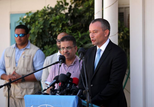
UN Special Coordinator for the settlement process in the Middle East Nikola Mladenov on Thursday declared that a UN meeting is to be held in the near future to discuss Gaza power and water crisis and reconstruction process.
In a press conference held shortly after reaching Gaza Strip, Mladenov said that a meeting is scheduled to be held on the sidelines of the UN General Assembly session by the end of this month.
The meeting is expected to bring further progress in settling Gaza crisis, he said.
Early Thursday, Mladenov arrived to the blockaded enclave through the Israeli-controlled Erez crossing. It is the second visit paid by Mladenov to Gaza since he was appointed as the UN Special Coordinator for the settlement process in the Middle East last March.
His few-hour visit aims at discussing Gaza reconstruction process and finding solutions for the economic crisis faced by 1.8 million people in the besieged Strip.
"It is very important to achieve a better life for the people of Gaza," Miladenov said.
“The people’s anger grows over the massive economic deterioration and the continued power outages here. Thus, this anger would certainly lead to extremism. So, we must double our efforts for Gaza reconstruction.”
Meanwhile, he gave a rare upbeat assessment in the Gaza Strip, saying that reconstruction from last year's war on Gaza is speeding up.
The reconstruction of hundreds of houses started last month with the help of Qatar, which has donated millions of dollars to rebuild 1,000 housing units, he pointed out.
"I'm very happy to be able to report today that the reconstruction effort has visibly accelerated within the last two months," said Mladenov.
However, he noted that Gaza reconstruction process is facing a major shortfall in humanitarian funding.
"We are very far from reaching the goal of restoring normal life to Gaza," Miladenov said.
"We will work with both the Israeli and Palestinian parties to solve Gaza crisis," he vowed.
In this regard, he called on the Palestinian Authority to take full control and responsibility in Gaza in order to achieve its faster reconstruction.
More than 2,200 Palestinians, including 500 children, were killed during the Israeli 51-day aggression on Gaza last summer, while thousands of homes, schools, and hospitals were destroyed.
In a press conference held shortly after reaching Gaza Strip, Mladenov said that a meeting is scheduled to be held on the sidelines of the UN General Assembly session by the end of this month.
The meeting is expected to bring further progress in settling Gaza crisis, he said.
Early Thursday, Mladenov arrived to the blockaded enclave through the Israeli-controlled Erez crossing. It is the second visit paid by Mladenov to Gaza since he was appointed as the UN Special Coordinator for the settlement process in the Middle East last March.
His few-hour visit aims at discussing Gaza reconstruction process and finding solutions for the economic crisis faced by 1.8 million people in the besieged Strip.
"It is very important to achieve a better life for the people of Gaza," Miladenov said.
“The people’s anger grows over the massive economic deterioration and the continued power outages here. Thus, this anger would certainly lead to extremism. So, we must double our efforts for Gaza reconstruction.”
Meanwhile, he gave a rare upbeat assessment in the Gaza Strip, saying that reconstruction from last year's war on Gaza is speeding up.
The reconstruction of hundreds of houses started last month with the help of Qatar, which has donated millions of dollars to rebuild 1,000 housing units, he pointed out.
"I'm very happy to be able to report today that the reconstruction effort has visibly accelerated within the last two months," said Mladenov.
However, he noted that Gaza reconstruction process is facing a major shortfall in humanitarian funding.
"We are very far from reaching the goal of restoring normal life to Gaza," Miladenov said.
"We will work with both the Israeli and Palestinian parties to solve Gaza crisis," he vowed.
In this regard, he called on the Palestinian Authority to take full control and responsibility in Gaza in order to achieve its faster reconstruction.
More than 2,200 Palestinians, including 500 children, were killed during the Israeli 51-day aggression on Gaza last summer, while thousands of homes, schools, and hospitals were destroyed.
16 sept 2015
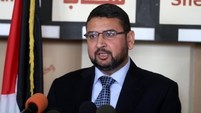
Palestinian factions met on Tuesday with Minister of Justice Salim al-Saqqa and Minister of Public Works Mufid al-Hasaina in the presence of Fathi Sheikh Khalil, the chairman of Gaza Power Company, to discuss the power crisis in the blockaded enclave.
Hamas spokesman Sami Abu Zuhri said, in a statement, it was agreed in the meeting on forming a national committee of the Palestinian factions to follow up the power crisis and to approach officials in Ramallah in order to work on solving the crisis as well as to come up with strategic solutions.
It was also confirmed based on data and discussions that Gaza Power Company transferred money required to get sufficient amounts of fuel to operate the plant to Ramallah, but the fuel has not reached Gaza yet, Abu Zuhri revealed.
“Accordingly, President of the Energy Authority Omar Katana was contacted for the transfer of fuel to Gaza power plants. He was invited to visit Gaza in his formal capacity as President of the Energy Authority in order to work on solving the aggravating power crisis", Abu Zuhri said.
Hamas spokesman Sami Abu Zuhri said, in a statement, it was agreed in the meeting on forming a national committee of the Palestinian factions to follow up the power crisis and to approach officials in Ramallah in order to work on solving the crisis as well as to come up with strategic solutions.
It was also confirmed based on data and discussions that Gaza Power Company transferred money required to get sufficient amounts of fuel to operate the plant to Ramallah, but the fuel has not reached Gaza yet, Abu Zuhri revealed.
“Accordingly, President of the Energy Authority Omar Katana was contacted for the transfer of fuel to Gaza power plants. He was invited to visit Gaza in his formal capacity as President of the Energy Authority in order to work on solving the aggravating power crisis", Abu Zuhri said.
14 sept 2015
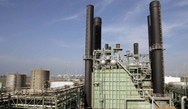
Vice president of the Energy Authority Fathi Sheikh Khalil blamed Monday the General Petroleum Authority (GPA) in Ramallah for reducing the plant's fuel share.
In a press conference held in Gaza City, Sheikh Khalil said that Gaza’s major projects were disrupted due to political wrangling over the past eight years.
The authority paid the fuel price for the transfer of two million liters in order to avoid the daily blackouts during the Jewish holidays; however, only one million liter was transferred, he clarified.
“The Gaza Strip requires about 400 megawatts of electricity a day but only 200 megawatts are available, while the dysfunction of the Egyptian electricity feeder lines has deepened the power crisis in the Strip.”
"We have repeatedly warned of the GPA procedure of disrupting the entry of sufficient amounts of fuel into the power station despite the closure of the Israeli controlled crossings,” he elaborated.
The Palestinian official held Rami Hamdallah’s government responsible for not resolving Gaza’s power crisis, saying that the authority is ready to coordinate with any party in order to improve Gaza’s situation.
In a press conference held in Gaza City, Sheikh Khalil said that Gaza’s major projects were disrupted due to political wrangling over the past eight years.
The authority paid the fuel price for the transfer of two million liters in order to avoid the daily blackouts during the Jewish holidays; however, only one million liter was transferred, he clarified.
“The Gaza Strip requires about 400 megawatts of electricity a day but only 200 megawatts are available, while the dysfunction of the Egyptian electricity feeder lines has deepened the power crisis in the Strip.”
"We have repeatedly warned of the GPA procedure of disrupting the entry of sufficient amounts of fuel into the power station despite the closure of the Israeli controlled crossings,” he elaborated.
The Palestinian official held Rami Hamdallah’s government responsible for not resolving Gaza’s power crisis, saying that the authority is ready to coordinate with any party in order to improve Gaza’s situation.
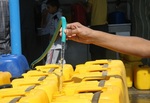
From time to time it can be difficult to overlook the water crisis in the Palestinian territories, especially the Gaza Strip.
Nearly two million Gazans suffer from environmental and humanitarian crises that are exacerbated by the water crisis.
Occupation control
The first and main reason for the water crisis in Palestine is the Israeli occupation’s control over water resources whether in Gaza or in the West Bank; the second reason is the Palestinian mismanagement and poor distribution of the available water resources.
These findings were reported by the PIC correspondent during the panel discussion organized by the Palestinian NGOs Network in Gaza entitled: "Water crisis in Palestine".
Dr. Abdulrahman Tamimi, director of the hydrologists group, confirmed during the discussion that Gaza Strip is experiencing an environmental and humanitarian crisis and catastrophe which entails finding quick solutions and strategies to manage the water and sanitations sectors.
Dr. Tamimi pointed out that it is possible to overcome the water crisis by transferring water from one region to the other. He said that water can be transferred from Tulkarem and Qalqilya governorates to Jenin governorate for example.
And he pointed to a problem he described as "big" which is citizens' ownership of water wells dug randomly recently or long time ago.
"Therefore, working on solving this problem will make it possible to transfer water which is privately owned to become public and distributed to the regions in need," he said, stressing that water is a right for everyone.
Water theft
He underlined that the Israeli occupation authority had worked on constructing 12 desalination plants to solve its water shortages among which 4 are completed, while there is no Palestinian plan regarding the crisis.
He said that Gaza Strip relies on groundwater as the only source of water supply for all uses.
He also said that the Palestinian decision-maker pursues partial solutions instead of adopting comprehensive ones.
He resolved that: "If this situation remains unchanged the Palestinians will unfortunately be in the near future customers of the water, gas, and power companies” of Israel".
The crisis in Palestine
The director of the NGO Network, Amjad Shawwa, stressed the importance of holding this panel discussion at this time to “review the components, reasons and suggested solutions for the water crisis in Palestine".
And he pointed out that 95% of the Gaza Strip water is unfit for human use. Also: PDF
Nearly two million Gazans suffer from environmental and humanitarian crises that are exacerbated by the water crisis.
Occupation control
The first and main reason for the water crisis in Palestine is the Israeli occupation’s control over water resources whether in Gaza or in the West Bank; the second reason is the Palestinian mismanagement and poor distribution of the available water resources.
These findings were reported by the PIC correspondent during the panel discussion organized by the Palestinian NGOs Network in Gaza entitled: "Water crisis in Palestine".
Dr. Abdulrahman Tamimi, director of the hydrologists group, confirmed during the discussion that Gaza Strip is experiencing an environmental and humanitarian crisis and catastrophe which entails finding quick solutions and strategies to manage the water and sanitations sectors.
Dr. Tamimi pointed out that it is possible to overcome the water crisis by transferring water from one region to the other. He said that water can be transferred from Tulkarem and Qalqilya governorates to Jenin governorate for example.
And he pointed to a problem he described as "big" which is citizens' ownership of water wells dug randomly recently or long time ago.
"Therefore, working on solving this problem will make it possible to transfer water which is privately owned to become public and distributed to the regions in need," he said, stressing that water is a right for everyone.
Water theft
He underlined that the Israeli occupation authority had worked on constructing 12 desalination plants to solve its water shortages among which 4 are completed, while there is no Palestinian plan regarding the crisis.
He said that Gaza Strip relies on groundwater as the only source of water supply for all uses.
He also said that the Palestinian decision-maker pursues partial solutions instead of adopting comprehensive ones.
He resolved that: "If this situation remains unchanged the Palestinians will unfortunately be in the near future customers of the water, gas, and power companies” of Israel".
The crisis in Palestine
The director of the NGO Network, Amjad Shawwa, stressed the importance of holding this panel discussion at this time to “review the components, reasons and suggested solutions for the water crisis in Palestine".
And he pointed out that 95% of the Gaza Strip water is unfit for human use. Also: PDF
13 sept 2015
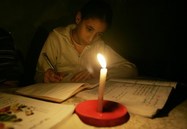
Gaza Power Plant (GPP) halted one of its power generators and re-applied the Gaza Strip' electricity schedule of 6 hours supply and 12 hours blackout due to lack of fuel.
The electricity distribution company said in a statement that the GPP was forced on Saturday in coordination with the Palestinian Energy Authority to stop a generator in its plant due to the lack of diesel enough to run that generator because of the Israeli closure of the crossing points which prevents the entry of sufficient amounts of industrial diesel.
The company added that the power outage coincides with the failure of all Egyptian lines feeding southern areas of the Gaza Strip with diesel, which worsened the electricity crisis.
The company appealed all parties, including the UN and international human rights institutions, to pressure the Israeli occupation in order to allow sufficient quantities of industrial diesel to the power station.
It warned that the insufficient power supply from the three sources (Egypt, Israel and the GPP) will have a dramatic impact on citizens.
Citizens of Rafah, in southern Gaza, staged several mass protests and demonstrations against the crisis of power outages.
The electricity distribution company said in a statement that the GPP was forced on Saturday in coordination with the Palestinian Energy Authority to stop a generator in its plant due to the lack of diesel enough to run that generator because of the Israeli closure of the crossing points which prevents the entry of sufficient amounts of industrial diesel.
The company added that the power outage coincides with the failure of all Egyptian lines feeding southern areas of the Gaza Strip with diesel, which worsened the electricity crisis.
The company appealed all parties, including the UN and international human rights institutions, to pressure the Israeli occupation in order to allow sufficient quantities of industrial diesel to the power station.
It warned that the insufficient power supply from the three sources (Egypt, Israel and the GPP) will have a dramatic impact on citizens.
Citizens of Rafah, in southern Gaza, staged several mass protests and demonstrations against the crisis of power outages.
12 sept 2015
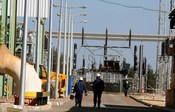
The Palestinian Energy Authority declared that Gaza’s sole power plant stopped working Saturday due to “the General Petroleum Authority's procedure of disrupting the entry of sufficient amounts of fuel into the power station.”
In a statement issued on Friday, the authority blamed Israel for closing Karem Abu Salem border crossing, through which goods and fuel enter into the Gaza Strip, till Tuesday under the pretext of Jewish holidays.
The statement lashed out at the General Petroleum Authority (GPA) in Ramallah for reducing the plant's fuel share.
"We made great efforts to push for the opening of Karem Abu Salem crossing exceptionally on Friday but the efforts were unsuccessful," the authority said.
The authority said that the GPA reduced the fuel quantities allowed into the besieged enclave for unreasonable pretexts, ignoring all national and humanitarian considerations.
For its part, Gaza Electricity Distribution Company declared that daily blackouts of around 12 hours are expected in the coming days.
The company said that dysfunction of the Egyptian electricity feeder lines has deepened the power crisis in the Strip.
The electricity company concluded by calling on the United Nations and international rights institutions to pressure the Israeli authorities to allow the entry of sufficient amounts of fuel needed for operating the power plant.
Gaza's 1.8 million people have been enduring daily blackouts of around 12 hours due to a fuel shortage caused by the Israeli unfair siege imposed on the Strip since 2007.
In a statement issued on Friday, the authority blamed Israel for closing Karem Abu Salem border crossing, through which goods and fuel enter into the Gaza Strip, till Tuesday under the pretext of Jewish holidays.
The statement lashed out at the General Petroleum Authority (GPA) in Ramallah for reducing the plant's fuel share.
"We made great efforts to push for the opening of Karem Abu Salem crossing exceptionally on Friday but the efforts were unsuccessful," the authority said.
The authority said that the GPA reduced the fuel quantities allowed into the besieged enclave for unreasonable pretexts, ignoring all national and humanitarian considerations.
For its part, Gaza Electricity Distribution Company declared that daily blackouts of around 12 hours are expected in the coming days.
The company said that dysfunction of the Egyptian electricity feeder lines has deepened the power crisis in the Strip.
The electricity company concluded by calling on the United Nations and international rights institutions to pressure the Israeli authorities to allow the entry of sufficient amounts of fuel needed for operating the power plant.
Gaza's 1.8 million people have been enduring daily blackouts of around 12 hours due to a fuel shortage caused by the Israeli unfair siege imposed on the Strip since 2007.
11 sept 2015
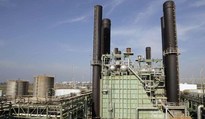
Gaza’s sole power station will completely stop working on Saturday, the Palestinian Energy Authority warned Thursday.
The Energy Authority said that the power station will stop functioning due to the Israeli closure of Karem Abu Salem border crossing, through which goods and fuel enter into the Gaza Strip, till Tuesday under the pretext of Jewish holidays.
The authority has earlier warned of frequent power outages due to the hot summer weather and the limited amounts of Israeli and Qatari fuel quantities allowed into the besieged enclave.
The Energy Authority in Gaza also denounced the General Petroleum Authority's procedure of disrupting the entry of sufficient amounts of fuel into the power station for extra generators to operate and keep up with the big increase in consumption.
Gaza's 1.8 million people have been enduring daily blackouts of around 12 hours due to a fuel shortage caused by the Israeli unfair siege imposed on the Strip since 2007.
The Energy Authority said that the power station will stop functioning due to the Israeli closure of Karem Abu Salem border crossing, through which goods and fuel enter into the Gaza Strip, till Tuesday under the pretext of Jewish holidays.
The authority has earlier warned of frequent power outages due to the hot summer weather and the limited amounts of Israeli and Qatari fuel quantities allowed into the besieged enclave.
The Energy Authority in Gaza also denounced the General Petroleum Authority's procedure of disrupting the entry of sufficient amounts of fuel into the power station for extra generators to operate and keep up with the big increase in consumption.
Gaza's 1.8 million people have been enduring daily blackouts of around 12 hours due to a fuel shortage caused by the Israeli unfair siege imposed on the Strip since 2007.
10 sept 2015
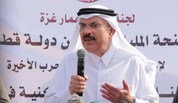
Head of Qatar’s National Committee for the Reconstruction of Gaza Ambassador Mohamed al-Emadi, arrived in the Gaza Strip via Beit Hanoun (Erez) crossing on Thursday.
Ahmed Abu Ras, director of the committee's technical bureau, stated that Emadi, who stopped over in Ramallah en route to Gaza, is scheduled to pay a two-week visit to Palestine, mostly in Gaza.
The Ambassador Emadi will sign new project contracts with a cost estimated at 60 million dollars.
Local sources revealed that Emadi held talks with Palestinian Prime Minister Rami al-Hamdallah in Ramallah about common issues and achievements of the Qatari National Committee in terms of the Qatari accomplished projects and those under construction.
Other issues including latest developments on the implementation of the Qatari projects and the acceleration of the base of reconstruction were also brought to discussion.
The Issue of power crisis in the blockaded enclave would be discussed in Gaza, the sources pointed out.
In Ramallah’s meeting, Emadi acquainted Fatah leaders with the implementation process of some of the Qatari projects, most significant, the construction of 100,000 homes of those completely damaged by a cost estimated at 50 million dollars.
In last June during his visit to Gaza, The Qatari Ambassador signed several construction and infrastructure projects valued with a total of 32 million dollars.
Ahmed Abu Ras, director of the committee's technical bureau, stated that Emadi, who stopped over in Ramallah en route to Gaza, is scheduled to pay a two-week visit to Palestine, mostly in Gaza.
The Ambassador Emadi will sign new project contracts with a cost estimated at 60 million dollars.
Local sources revealed that Emadi held talks with Palestinian Prime Minister Rami al-Hamdallah in Ramallah about common issues and achievements of the Qatari National Committee in terms of the Qatari accomplished projects and those under construction.
Other issues including latest developments on the implementation of the Qatari projects and the acceleration of the base of reconstruction were also brought to discussion.
The Issue of power crisis in the blockaded enclave would be discussed in Gaza, the sources pointed out.
In Ramallah’s meeting, Emadi acquainted Fatah leaders with the implementation process of some of the Qatari projects, most significant, the construction of 100,000 homes of those completely damaged by a cost estimated at 50 million dollars.
In last June during his visit to Gaza, The Qatari Ambassador signed several construction and infrastructure projects valued with a total of 32 million dollars.
holes and the pumping stations were [heavily hit.] More than 50 percent of the water infrastructure could not be accessed. Some of the infrastructure was completely destroyed.”
And since the 2014 onslaught, Israel has prevented the import of materials that could repair the damage – thus further exacerbating the already dire humanitarian crisis.
Prior to Israel’s invasion of Gaza in July 2014, the Israeli Information Center for Human Rights in the Occupied Palestinian Territories B’Tselem issued a report that 90% of the water in Gaza was unfit for drinking.
Ibtesam Kheir a-Din, 48, a married mother of six lives in a-Sultan neighborhood, Rafah, related to B'Tselem, “The water we get is salty and unfit for drinking. Sometimes it even smells bad. We use it only to clean the house and do dishes and laundry, but nothing ever feels really clean. The clothes sometimes smell bad and get stained. The water also ruins the washing machine.
We've fixed the machine several times, which cost us 50 to 70 shekels [approx. 14 USD – 20USD] every time, and the technician said the problems were caused by the too many salts in the water. We don't drink the water or use it for cooking. For cooking and drinking, we buy water every day from vendors who go around the neighborhood or from shops that sell water containers. We buy 50 liters of fresh water a day, at two shekels [approx. 0.6 USD] a liter.
Lately, because power outages have gone on for as long as twelve hours at time and because we don't have enough money to pay for fuel to run the generator to fill the containers, we've started buying water for dishwashing and laundry, too.”
According to RT, the Gaza Strip’s GDP dropped 15 percent in 2014, with 72 percent of households suffering extremely low food security and unemployment at a record high of 44 percent. Further stress was added by relentless Israeli assaults. With three military operations in the last six years, coupled with eight years of economic blockade, prospects for recovery are looking very bleak.
The UN says that 500,000 people have been displaced in Gaza as a result of last year's IDF operation alone. More than 20,000 Palestinian homes were destroyed, and 148 schools and 15 hospitals and 45 primary health-care centers were severely damaged. Gaza is one of the most densely populated areas in the world.
But the condition of the water is the worst part of the infrastructure destruction, as it leaves the population of Gaza largely without potable water.
According to the RT Report, unless the situation is resolved, the Strip stands on the brink of a full-scale humanitarian catastrophe much greater than any airstrikes can cause.
And since the 2014 onslaught, Israel has prevented the import of materials that could repair the damage – thus further exacerbating the already dire humanitarian crisis.
Prior to Israel’s invasion of Gaza in July 2014, the Israeli Information Center for Human Rights in the Occupied Palestinian Territories B’Tselem issued a report that 90% of the water in Gaza was unfit for drinking.
Ibtesam Kheir a-Din, 48, a married mother of six lives in a-Sultan neighborhood, Rafah, related to B'Tselem, “The water we get is salty and unfit for drinking. Sometimes it even smells bad. We use it only to clean the house and do dishes and laundry, but nothing ever feels really clean. The clothes sometimes smell bad and get stained. The water also ruins the washing machine.
We've fixed the machine several times, which cost us 50 to 70 shekels [approx. 14 USD – 20USD] every time, and the technician said the problems were caused by the too many salts in the water. We don't drink the water or use it for cooking. For cooking and drinking, we buy water every day from vendors who go around the neighborhood or from shops that sell water containers. We buy 50 liters of fresh water a day, at two shekels [approx. 0.6 USD] a liter.
Lately, because power outages have gone on for as long as twelve hours at time and because we don't have enough money to pay for fuel to run the generator to fill the containers, we've started buying water for dishwashing and laundry, too.”
According to RT, the Gaza Strip’s GDP dropped 15 percent in 2014, with 72 percent of households suffering extremely low food security and unemployment at a record high of 44 percent. Further stress was added by relentless Israeli assaults. With three military operations in the last six years, coupled with eight years of economic blockade, prospects for recovery are looking very bleak.
The UN says that 500,000 people have been displaced in Gaza as a result of last year's IDF operation alone. More than 20,000 Palestinian homes were destroyed, and 148 schools and 15 hospitals and 45 primary health-care centers were severely damaged. Gaza is one of the most densely populated areas in the world.
But the condition of the water is the worst part of the infrastructure destruction, as it leaves the population of Gaza largely without potable water.
According to the RT Report, unless the situation is resolved, the Strip stands on the brink of a full-scale humanitarian catastrophe much greater than any airstrikes can cause.
6 sept 2015
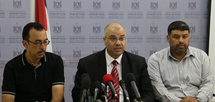
The Egyptian authorities are implanting a waterway project along Egypt’s borders with Gaza to “stop the smuggling tunnels”, a project that is seen by a number of the relevant government departments in Gaza to be a threat to water security.
The deputy head of the Water Authority in Gaza, Mazen al-Banna, addressed a press conference on Sunday also representing the Ministry of Agriculture, Water Authority, Authority of the Environment, and Ministry of Local Government. He stated, “The project is considered a violation of the rights of the two peoples (Egyptian and Palestinian).”
He demanded an instant halt of the project for the threats it imposes on many levels, including the water, economic, and national security of both Egypt and Palestine.
Al-Banna clarified that the implementation of this project disregards the environmental crises it would bring to Palestine, let alone Egypt. The threats include destroying the mutual groundwater reservoir in the region through the leakage of the salt water into the groundwater.
He stressed that the Egyptian project is an application of what the Israeli occupation tried to implement a decade ago. He recalled that the Israeli government back then planned to dig a waterway along the Egyptian-Palestinian borders to foil the Palestinian resistance’s efforts to smuggle weapons. Al-Banna noted that the Egyptian authorities have destroyed the vast majority of the tunnels.
The deputy head of the Water Authority called on the Egyptian people and government to take all measures to stop this project immediately.
He asked for an immediate UN intervention to put pressure on the Egyptian government to stop the catastrophic project that would endanger all environmental elements in the area.
Al-Banna urged the Arab League and the Organization of the Islamic Conference to exert influence on Egypt to halt the project that would threaten the Arab and Islamic national security.
He also urged the international eco-friendly and human rights organizations to interfere.
The Egyptian military bulldozers have commenced digging huge fishponds, that are to be filled with seawater, along the Gaza-Egypt borders.
The deputy head of the Water Authority in Gaza, Mazen al-Banna, addressed a press conference on Sunday also representing the Ministry of Agriculture, Water Authority, Authority of the Environment, and Ministry of Local Government. He stated, “The project is considered a violation of the rights of the two peoples (Egyptian and Palestinian).”
He demanded an instant halt of the project for the threats it imposes on many levels, including the water, economic, and national security of both Egypt and Palestine.
Al-Banna clarified that the implementation of this project disregards the environmental crises it would bring to Palestine, let alone Egypt. The threats include destroying the mutual groundwater reservoir in the region through the leakage of the salt water into the groundwater.
He stressed that the Egyptian project is an application of what the Israeli occupation tried to implement a decade ago. He recalled that the Israeli government back then planned to dig a waterway along the Egyptian-Palestinian borders to foil the Palestinian resistance’s efforts to smuggle weapons. Al-Banna noted that the Egyptian authorities have destroyed the vast majority of the tunnels.
The deputy head of the Water Authority called on the Egyptian people and government to take all measures to stop this project immediately.
He asked for an immediate UN intervention to put pressure on the Egyptian government to stop the catastrophic project that would endanger all environmental elements in the area.
Al-Banna urged the Arab League and the Organization of the Islamic Conference to exert influence on Egypt to halt the project that would threaten the Arab and Islamic national security.
He also urged the international eco-friendly and human rights organizations to interfere.
The Egyptian military bulldozers have commenced digging huge fishponds, that are to be filled with seawater, along the Gaza-Egypt borders.

